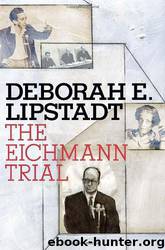The Eichmann Trial by Deborah E Lipstadt

Author:Deborah E Lipstadt [Lipstadt, Deborah E]
Language: eng
Format: epub
Tags: True Crime, World War 2, Done, Non Fiction, Military & Warfare
Publisher: Nextbook Schocken
Published: 2010-01-01T13:00:00+00:00
After Servatius concluded his examination came the long-awaited confrontation—“the battle of wits”—which the spectators who packed the courtroom had been anticipating: Hausner’s cross-examination. The exchange—described by one observer as a “duel”—turned ugly from the outset. Hausner wanted yes or no replies to his questions. Instead, he got labyrinthine, expansive nonresponses. The attorney general’s attempts to cut Eichmann off were to no avail. As the answers grew maddeningly more evasive, Hausner became increasingly frustrated. “The Accused was asked a question and he must answer it.… But he must not give replies in the form of lectures.” When that did not help, Hausner began to hector and shout. At one point, just as Eichmann uttered the word “because,” which was usually a precursor to one of his convoluted discourses, Hausner emphatically cut him off: “I don’t want to hear any ‘because.’ I want an answer.” Eichmann, seemingly oblivious to the attorney general’s demand, plowed on. An exasperated Hausner exploded: “Without ‘but,’ I want an answer!” Landau immediately admonished Hausner that Eichmann must be allowed to finish. Though Hausner’s combative style seemed beneath the dignity of both his office and this case, his frustrations were understandable. His plan was to build an evidentiary web around Eichmann and to box him in with one of two choices: either acknowledge what the evidence indicates you did, or deny it. If Eichmann did the former, he would be admitting his guilt. If he did the latter, particularly in light of evidence that so clearly implicated him, he would be exposing himself to the judges as a liar rather than the “honest defendant” he insisted he was.11
If Hausner was annoyed by Eichmann’s evasive style and meandering nonanswers, he was incensed by Eichmann’s assertion that he sought to help, not persecute, Jews. What documents, Hausner sneered, proved that “Jewish functionaries asked you to send Jews naked and penniless to Nisko?” Eichmann painted an idyllic portrait, one that was in stark contrast to the testimony offered by Nisko survivors. First Eichmann claimed that the Nisko plan had a benevolent motivation. He wanted to enable Jews to live “among themselves and not under the conditions of stress to which they were subjected in their previous localities.” He spoke as if the “stress” was an inherent condition in which he had no role. He had done the same thing when he expressed his “horror” that Captain Less’s father had been deported from Berlin and murdered in Auschwitz. His description of Nisko bore little relationship to reality: “Rivers, villages, markets, small towns … It would benefit all concerned.” Hausner challenged Eichmann’s bucolic description by observing that “even Polish farmers were unable to cultivate” land there, and no one drank the water because of fear of toxins. Eichmann, defending it as “not the worst,” contended that it was “not that certain” that the waters were poisoned. At the most they “might cause typhoid.” Eichmann described himself as being “enthusiastic” about finding an area to “be allocated for these Jewish needs.” Had Hausner stopped at this point, the absurdity of Eichmann’s claim would have stood on its own.
Download
This site does not store any files on its server. We only index and link to content provided by other sites. Please contact the content providers to delete copyright contents if any and email us, we'll remove relevant links or contents immediately.
| Africa | Americas |
| Arctic & Antarctica | Asia |
| Australia & Oceania | Europe |
| Middle East | Russia |
| United States | World |
| Ancient Civilizations | Military |
| Historical Study & Educational Resources |
Cecilia; Or, Memoirs of an Heiress — Volume 1 by Fanny Burney(31322)
Cecilia; Or, Memoirs of an Heiress — Volume 3 by Fanny Burney(30928)
Cecilia; Or, Memoirs of an Heiress — Volume 2 by Fanny Burney(30885)
The Secret History by Donna Tartt(16606)
Sapiens: A Brief History of Humankind by Yuval Noah Harari(13036)
Leonardo da Vinci by Walter Isaacson(11894)
The Radium Girls by Kate Moore(10901)
Sapiens by Yuval Noah Harari(4528)
The Wind in My Hair by Masih Alinejad(4420)
How Democracies Die by Steven Levitsky & Daniel Ziblatt(4392)
Homo Deus: A Brief History of Tomorrow by Yuval Noah Harari(4272)
Endurance: Shackleton's Incredible Voyage by Alfred Lansing(3834)
The Silk Roads by Peter Frankopan(3751)
Man's Search for Meaning by Viktor Frankl(3620)
Millionaire: The Philanderer, Gambler, and Duelist Who Invented Modern Finance by Janet Gleeson(3565)
The Rape of Nanking by Iris Chang(3507)
Hitler in Los Angeles by Steven J. Ross(3431)
The Motorcycle Diaries by Ernesto Che Guevara(3325)
Joan of Arc by Mary Gordon(3253)
